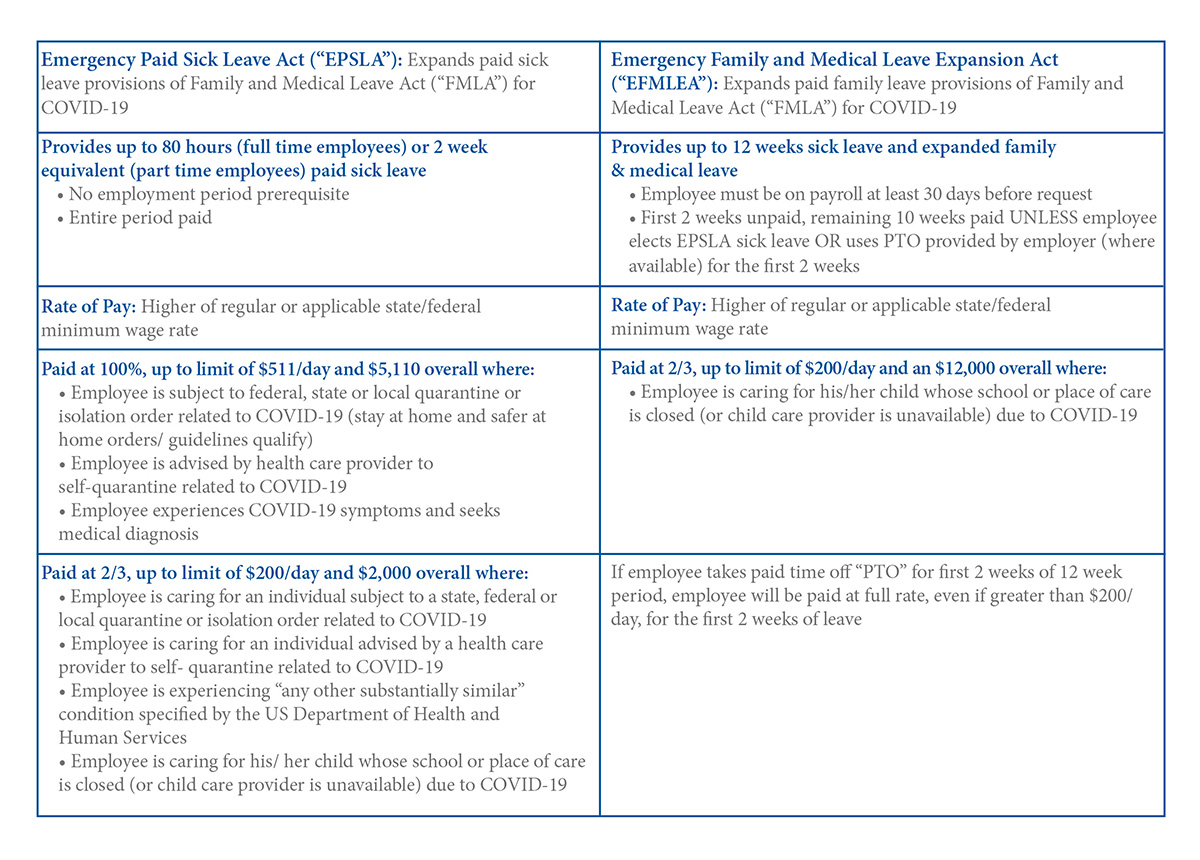GRB Law Update
Talking Points: The Families First Coronavirus Response Act (FFCRA)
Date: November 12, 2020
Practice Areas
Author Spotlight
 Jaime leads the firm's Litigation and Labor & Employment Groups. Her practice focuses on commercial and construction litigation, defense of product liability and toxic tort claims, insurance defense and coverage analysis.
About Jaime
Jaime leads the firm's Litigation and Labor & Employment Groups. Her practice focuses on commercial and construction litigation, defense of product liability and toxic tort claims, insurance defense and coverage analysis.
About Jaime
• Applies to private sector employers with fewer than 500 employees and to certain public sector employers.
• Effective Period: April 1, 2020 — December 31, 2020
• Employee must be unable to work, including telework, because of one of the approved COVID-19 related reasons.
• Employers may not discharge, discipline, or otherwise discriminate against any employee who lawfully takes the expanded leave provided hereunder, files a Complaint or other proceeding under or related to the FFCRA.
• Violators are subject to penalties and enforcement by the Wage and Hour Division. US Department of Labor
• Small Business Excpetion available for employers with less than 50 employees where granting leave would cause: 1) business expenses/financial obligations to exceed available business revenuws; 2) substantial risk to financial health or operational capabilities becuase of specialized skills, knowledge or responsibilities of requestor; or 3) lack of able, willing and qualified workers, at the time and place needed to perform requestor's work

• Vacated portions of the US DOL's final rule implementing the FFCRA related to:
• US DOL is within the appeal period. It could appeal the ruling, seek a stay, withdraw its final rule that was the subject of the lawsuit, or create new rules or interim guidance.
• Expect challenges in other states, inlcuding in PA.
* Recent case in the Southern District of New York, NY v. DOL, SDNY No. 20-03020, reported August 6, 2020 has binding effect in the Southern District of NY and is of persuasive authority in the Second Circuit Court of Appeals.
• Effective Period: April 1, 2020 — December 31, 2020
• Employee must be unable to work, including telework, because of one of the approved COVID-19 related reasons.
• Employers may not discharge, discipline, or otherwise discriminate against any employee who lawfully takes the expanded leave provided hereunder, files a Complaint or other proceeding under or related to the FFCRA.
• Violators are subject to penalties and enforcement by the Wage and Hour Division. US Department of Labor
• Small Business Excpetion available for employers with less than 50 employees where granting leave would cause: 1) business expenses/financial obligations to exceed available business revenuws; 2) substantial risk to financial health or operational capabilities becuase of specialized skills, knowledge or responsibilities of requestor; or 3) lack of able, willing and qualified workers, at the time and place needed to perform requestor's work
• Vacated portions of the US DOL's final rule implementing the FFCRA related to:
1) whether an employee is entitled to leave under the FFCRA if the employer has no work for employee where employee meets one of the 6 bases under the FFCRA for the leave (previously, no; now, yes);
2) definition of healthcar provider: exempted from coverage under the Act — now exempts healthcare professionals, not all employees of healthcare organization;
3) intermittent leave previously not allowed — not allowed for reasons that do not pose a risk to infection spread; and
4) documentation requirements — documentation required of employee's need for leave goes "far beyond" the statute
2) definition of healthcar provider: exempted from coverage under the Act — now exempts healthcare professionals, not all employees of healthcare organization;
3) intermittent leave previously not allowed — not allowed for reasons that do not pose a risk to infection spread; and
4) documentation requirements — documentation required of employee's need for leave goes "far beyond" the statute
• US DOL is within the appeal period. It could appeal the ruling, seek a stay, withdraw its final rule that was the subject of the lawsuit, or create new rules or interim guidance.
• Expect challenges in other states, inlcuding in PA.
* Recent case in the Southern District of New York, NY v. DOL, SDNY No. 20-03020, reported August 6, 2020 has binding effect in the Southern District of NY and is of persuasive authority in the Second Circuit Court of Appeals.
Your needs meet our solutions.
While presenting a broad range of industry focus, our attorneys all share the same mentality: provide the best insight, outcome and service to our clients.